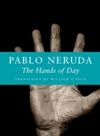
What can I say? If there’s an indispensable 20th century poet it’s Pablo Neruda. With all his flaws, as a person and a poet (but “what soul is without flaws?”, as Rimbaud asked rhetorically), Neruda’s poems are illuminations. He’s been translated by everybody, it seems, but among his best servants in that regard has been William O’Daly. Here are a couple of poems from O’Daly’s 2008 translation of The Hands of Day.
Bird
Here in the tree it sings.
It is a solitary bird, lifelong,
full of water that falls,
of crazy light that climbs,
of guttural crystal,
of ceaseless trill.Why?
And the question sings.
*
It Is Simple
Strength is mute (the trees tell me)
as is profundity (the roots tell me)
as is purity (the flour tells me).No tree ever said to me:
“I am the tallest of all.”No root ever said to me:
“I come from the very depths.”And never has the bread said:
“There is nothing like bread.”
These aren’t necessarily typical Neruda—I’m not even sure what “typical Neruda” would be, given the vastness of his forms and concerns. But they do fairly well represent the kind of writing you’ll find in The Hands of Day. And I hope you will!
The Perpetual Bird rating:


 Joseph Hutchison, Colorado Poet Laureate 2014-2019, has published 20 collections of poems and edited or co-edited three poetry anthologies. He currently directs two master’s-level programs for University College at the University of Denver: Professional Creative Writing and Arts & Culture Management. Joe lives with his wife, Melody Madonna, in the mountains southwest of Denver, Colorado, the city where he was born.
Joseph Hutchison, Colorado Poet Laureate 2014-2019, has published 20 collections of poems and edited or co-edited three poetry anthologies. He currently directs two master’s-level programs for University College at the University of Denver: Professional Creative Writing and Arts & Culture Management. Joe lives with his wife, Melody Madonna, in the mountains southwest of Denver, Colorado, the city where he was born. 










Awyn, books are (yes) an addiction, paving stones on a long, winding, descending path to impecuniosity. But it's a pleasure getting there: "Poverty in motion."
You gotta stop this, Joe–recommending books one doesn't have and suddenly gnawingly impatiently wants to. I hadn't heard about this new translation (in bilingual text to boot!). I especially liked the "It is Simple" example. And no pen ever said to me, "I am poetry in motion" (although some poets have implied it, ha ha).
Intriguing introduction. Thanks.